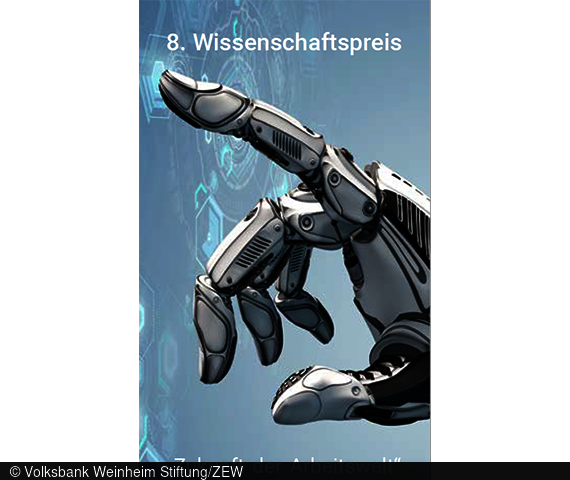Award for Outstanding Scientific Work
AwardsWith the research award “Future of the Working World”, the Volksbank Weinheim Stiftung and ZEW Mannheim honour outstanding dissertations and master’s theses in the field of economics. This year, the prize has been awarded for the eighth time following the decision of a seven-member jury. The award for the best dissertation went to Dr. Martin Lange. Ralf Landeck received the award for the best master’s thesis in economics.
“Usually, the award winners receive their award during our New Year’s reception, which was unfortunately not possible this year. Since it is important to us to present the awards in person, we have postponed the ceremony until the end of April. However, so that our laureates, who were selected at the beginning of the year, do not have to wait any longer, we have decided to announce them today and thus enable the launch of a new round of applications for the next science award,” says Carsten Müller, spokesperson of the Volksbank Kurpfalz eG’s executive board and chairman of the board of the Volksbank Weinheim Stiftung.
The award for the best master’s thesis is endowed with 2,000 euros, the one for the best dissertation with 3,000 euros. “With this award, Volksbank Kurpfalz and ZEW aim to promote young scientists, strengthen the scientific cooperation of the research institutions in the metropolitan region and give visibility to outstanding scientific work,” says ZEW Managing Director Thomas Kohl, outlining the objectives of the award. How well this has succeeded in the past is shown, among other things, by the fact that many of the award winners are now working in renowned research institutions and organisations.
With the research award, ZEW and the Volksbank Weinheim Stiftung honour theses that combine academic excellence with practical relevance and that stand out through both an empirical focus and an original topic. Lange’s dissertation entitled “Empirical Essays on the Nexus of Immigration, Crime, and Attitudes towards Immigration” fully meets this requirement. It comprises three academic papers containing research results from projects in which Lange examined the German population’s attitudes towards immigration. Martin Lange makes an important contribution to gaining knowledge in this field by analysing the German population’s approval or rejection of immigration and looking at the determinants to which this can be attributed.
The awarded master’s thesis by Ralf Landeck is entitled “Chancen und Grenzen der Einführung digitaler Badges in Anlernberufen – Eine Interviewstudie mit verschiedenen Stakeholdern” (“Opportunities and Limitations of the Introduction of Digital Badges in Low-Skilled Occupations – an Interview Study with Various Stakeholders”). In his work, Landeck examines the potential of digital badges to recognise informally acquired competences among employees in low-skilled occupations. Digital badges are electronic certificates that certify certain competences, skills and knowledge. The opportunities and limitations of digital badges for the low-skilled were impressively presented by Landeck in his thesis.
Martin Lange studied economics at Humboldt University in Berlin as well as at the University of Mannheim, and received his PhD from Goethe University Frankfurt in March 2020. Ralf Landeck completed a dual study programme at a medium-sized cooperative bank. After working as a consultant in this field, he studied business education at the University of Mannheim, where he wrote his master’s thesis at the Chair of Economic and Business Education – Professional Teaching and Learning.
